The 8 best electronic signature apps in 2025
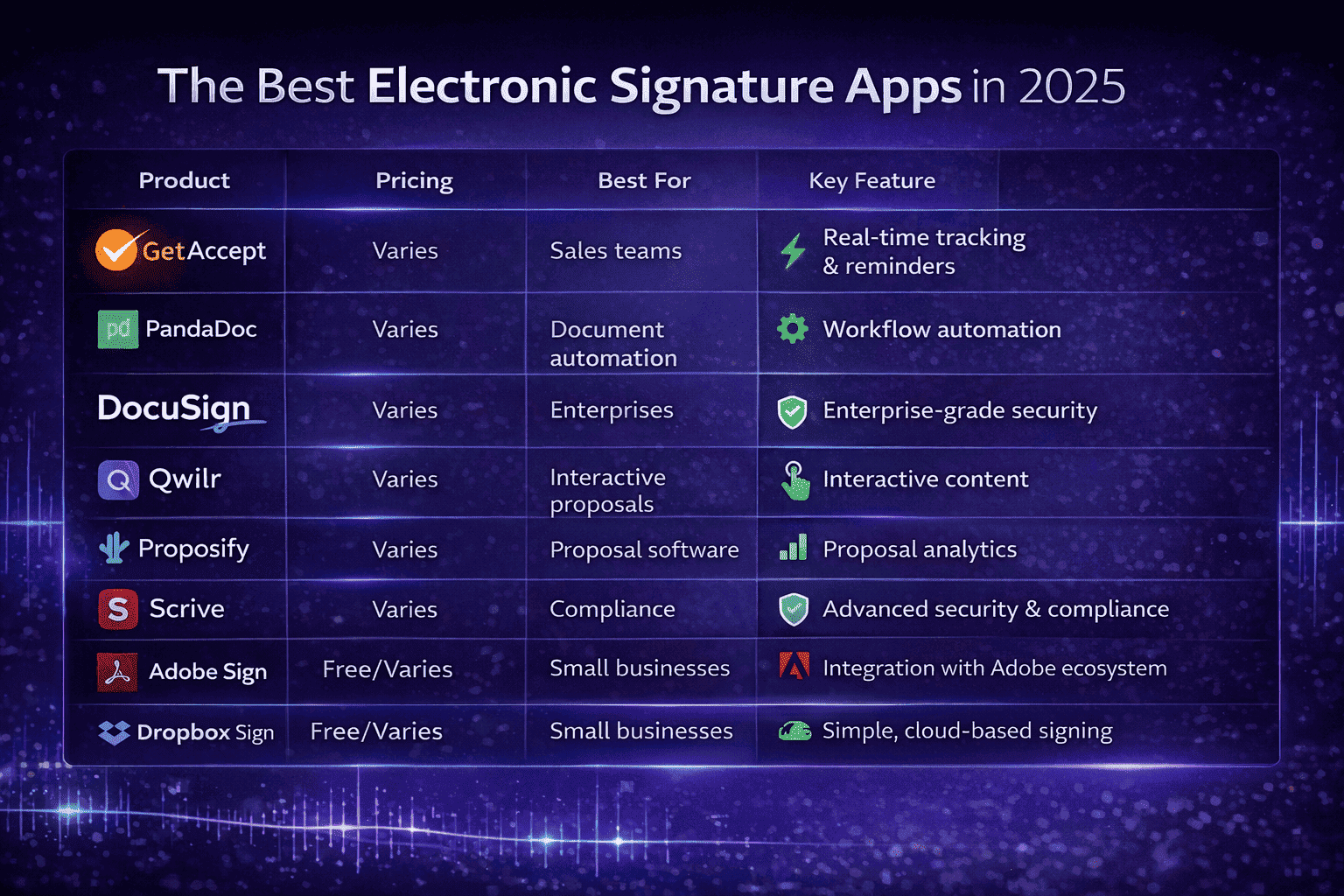
Key takeaways
Security & compliance matter most: Choose platforms that meet eIDAS, ESIGN, HIPAA, and SOC standards for legally binding signatures.
Integrations speed workflows: Deep integrations with CRMs, document tools, and storage (Salesforce, Google Workspace, Adobe) cut manual work.
Automation and templates boost efficiency: Document automation, reusable templates, and conditional routing save time and reduce errors.
Choose by use case and scale: Simple tools suit freelancers/small biz; enterprise-ready solutions (DocuSign/Adobe Sign) are best for regulated, high-volume needs.
Measure engagement & ROI: Look for tracking, analytics, and audit trails to monitor document views, signatures, and conversion impact.
Introduction
Tired of the endless cycle of printing, scanning, and physically chasing down signatures? There's a far more efficient way to handle everything from closing critical deals to securing simple approvals. Electronic signature software is designed to cut through the manual clutter, accelerate your processes, and keep your business momentum strong.
However, the landscape of e-signature tools is vast and varied. While some platforms offer straightforward signing capabilities, others go much further, integrating with your CRM, automating proposal generation, and even providing real-time engagement tracking. Choosing the right one isn't a one-size-fits-all decision; it hinges on your specific needs.
This guide cuts through the generic overviews you might find elsewhere. We've rigorously researched and evaluated the leading e-signature platforms of 2025, focusing on their real-world performance, usability, integration capabilities, and security. By comparing their distinct strengths, weaknesses, and ideal use cases, we’ll help you pinpoint the electronic signature app that will truly streamline your workflow and empower your business to move forward with confidence.
Quick Comparison
Product | Pricing | Best For | Key Feature |
|---|---|---|---|
GetAccept | Varies | Sales teams | Real-time tracking & reminders |
PandaDoc | Varies | Document automation | Workflow automation |
DocuSign | Varies | Enterprises | Enterprise-grade security |
Qwilr | Varies | Interactive proposals | Interactive content |
Proposify | Varies | Proposal software | Proposal analytics |
Scrive | Varies | Compliance | Advanced security & compliance |
Adobe Sign | Varies | General business | Integration with Adobe ecosystem |
Dropbox Sign | Free/Varies | Small businesses | Simple, cloud-based signing |
1. DocuSign: Enterprise E-Signatures
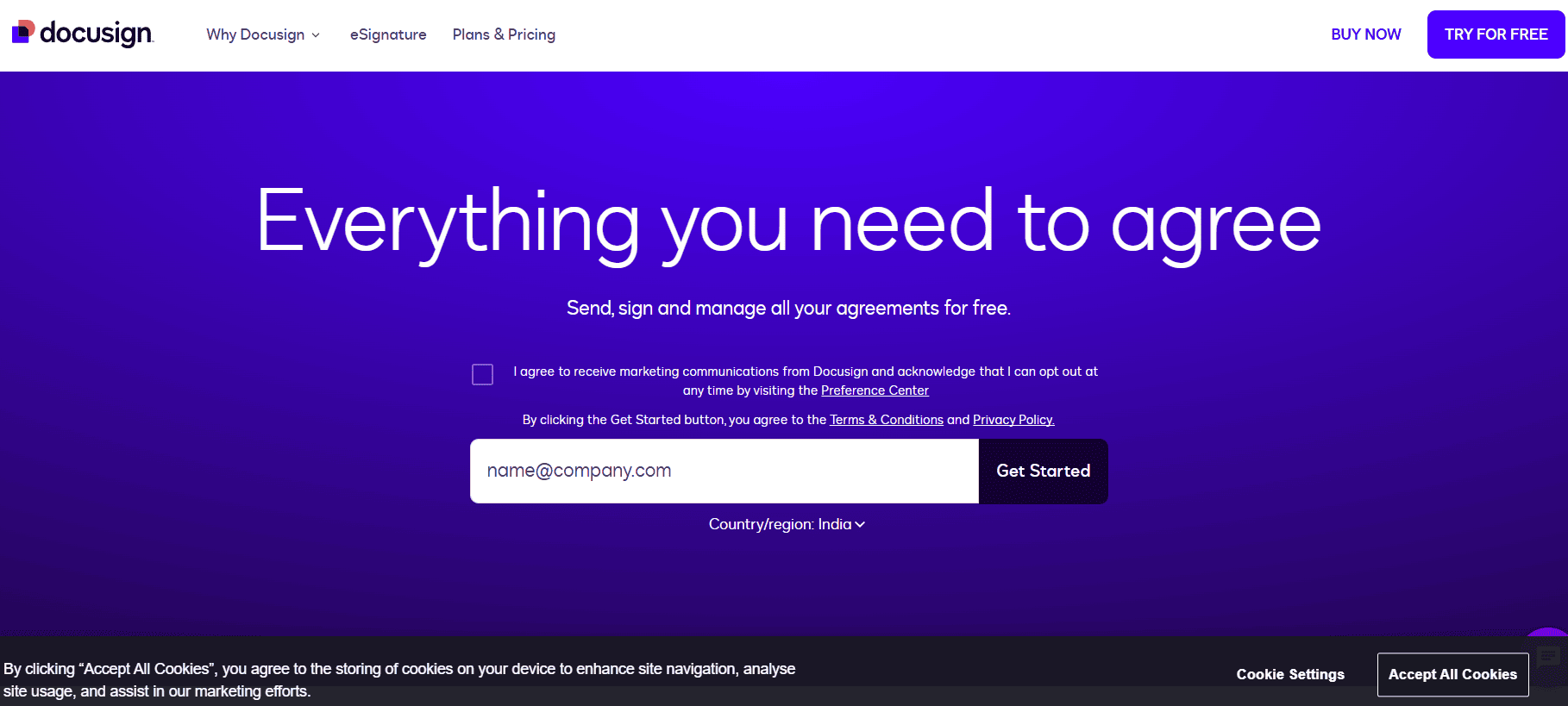
DocuSign is an electronic signature platform renowned for its enterprise-grade security and robust compliance features. It's designed to handle a high volume of agreements and complex workflows, making it a go-to solution for large organizations that prioritize data integrity and regulatory adherence. The platform streamlines the entire agreement process, from preparation and sending to signing and managing, all within a secure digital environment. Its core value lies in providing trust and assurance for critical business transactions.
Key Features:
Enterprise-Grade Security: DocuSign implements advanced security measures, including encryption, audit trails, and identity verification, to protect sensitive information. This makes it suitable for industries with strict data protection requirements.
Comprehensive Compliance: The platform adheres to global compliance standards such as ESIGN, UETA, eIDAS, and HIPAA, ensuring legal validity and enforceability of electronic signatures across different jurisdictions.
Integration Capabilities: DocuSign offers extensive integrations with popular business applications like Salesforce, Microsoft 365, Google Workspace, and CRM systems, allowing for seamless incorporation into existing workflows.
API Access: Developers can leverage DocuSign's APIs to embed e-signature functionality into custom applications, further extending its utility.
Advanced Workflow Management: The platform supports complex agreement workflows, including multi-party signing, conditional routing, and automated reminders, which is crucial for managing high-stakes contracts.
Pros:
Top-tier Security and Compliance: DocuSign is a leader in providing a secure and legally sound environment for electronic signatures, offering peace of mind for regulated industries.
Scalability: Its robust infrastructure is built to handle significant transaction volumes, making it ideal for growing businesses and large enterprises.
Extensive Integrations: The wide array of available integrations simplifies adoption and enhances productivity by connecting with tools businesses already use.
Cons:
Expensive for Small Businesses: DocuSign's feature set and pricing structure can be prohibitive for smaller companies or those with simpler e-signature needs.
Complex Interface: While powerful, the platform can present a steeper learning curve for new users compared to more straightforward solutions.
Pricing:
DocuSign offers several plans, typically starting with a Personal plan around $10/month (billed annually) for basic signing. However, for business use, the Standard plan is a more common entry point, often priced around $25/month (billed annually), offering more features like templates and basic workflow. The Professional plan, around $40/month (billed annually), unlocks more advanced features like API access and integrations. Enterprise plans are custom-quoted and designed for larger organizations with specific needs.
Best For:
DocuSign is best suited for medium to large enterprises, particularly those in regulated industries like finance, healthcare, legal, and government, where security, compliance, and auditability are paramount. It's also an excellent choice for organizations that require extensive integrations with their existing business software stack or need to manage a high volume of complex agreements.
Bottom Line:
DocuSign stands out for its unparalleled security and compliance, making it the benchmark for enterprise-level electronic signatures. While its cost and complexity might deter smaller businesses, its robust features and scalability make it an indispensable tool for larger organizations seeking a secure, reliable, and legally sound digital transaction platform. If your priority is ironclad security and comprehensive compliance for critical agreements, DocuSign is a top contender.
2. Adobe Sign
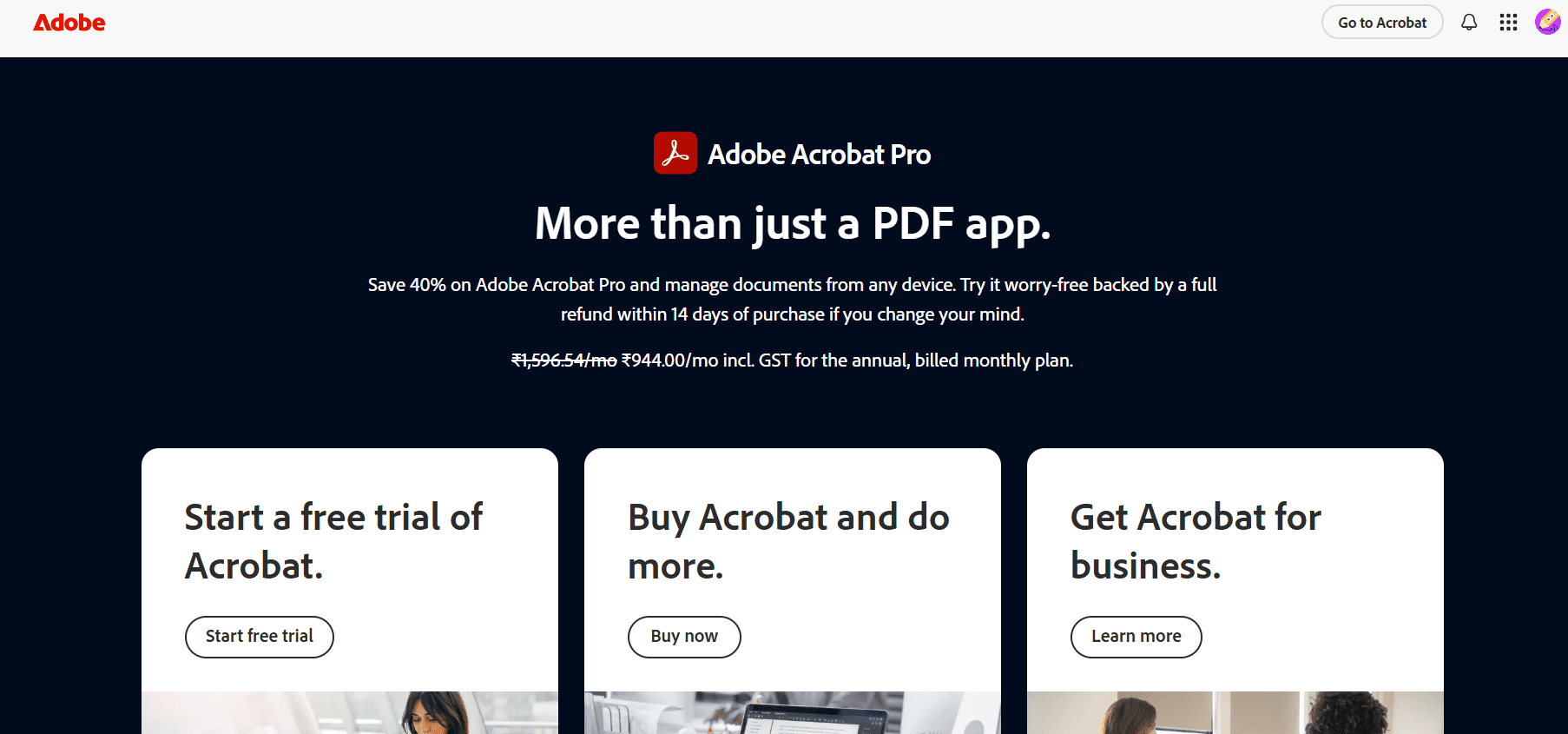
Adobe Sign is a robust electronic signature solution designed for enterprise-level security and broad integration capabilities, making it ideal for organizations that require a high degree of compliance and seamless workflow automation. It leverages Adobe's established reputation in document management to offer a secure and reliable platform for sending, signing, and tracking documents. This service is particularly strong in environments where digital transformation is a priority and advanced document workflows are commonplace.
Key Features:
Enterprise-Grade Security and Compliance: Adobe Sign is built with stringent security protocols and meets various compliance standards, including ISO 27001, SOC 2 Type 2, HIPAA, and GDPR. This makes it a trusted choice for industries handling sensitive data, such as finance, healthcare, and legal.
Integration with Adobe Acrobat: As part of the Adobe ecosystem, it offers deep integration with Adobe Acrobat, allowing users to prepare, send, and sign documents directly within their familiar PDF tools. This streamlines the process of creating and managing documents.
Broad Application Integrations: Beyond Adobe products, Adobe Sign integrates with a wide array of business applications, including Microsoft 365, Salesforce, Workday, and Google Workspace. These integrations allow for embedding e-signature workflows directly into existing CRM, ERP, and collaboration platforms, minimizing context switching.
Real-time Tracking and Audit Trails: Comprehensive audit trails are generated for every transaction, providing a detailed history of who signed, when, and from where. Real-time tracking notifies users of document status, ensuring visibility throughout the signing process.
Reusable Templates: Users can create reusable document templates, pre-populating fields like recipient information and signature blocks. This significantly speeds up the process for frequently used agreements, contracts, or forms.
Pros:
Unmatched Security and Compliance: Its adherence to numerous global compliance standards provides peace of mind for businesses operating in regulated industries.
Seamless Adobe Ecosystem Integration: For organizations already invested in Adobe's suite, the integration with Acrobat and other Adobe products is a significant advantage, offering a unified document management experience.
Extensive Integration Options: The wide range of third-party application integrations allows businesses to embed e-signatures into their existing tech stacks, enhancing efficiency.
Cons:
Expensive for Small Businesses: The robust feature set and enterprise focus translate into higher pricing, making it less accessible for very small businesses or individuals with basic needs.
Complexity for Basic Use Cases: While powerful, its extensive features can present a steeper learning curve for users who only require simple, standalone signing capabilities.
Pricing:
Adobe Sign offers various plans, often bundled within Adobe Acrobat Pro DC or as standalone enterprise solutions. Pricing is typically on a per-user, per-year basis. While specific public pricing tiers can vary and are often customized for enterprise clients, entry-level plans can start around $10-$15 per user per month for basic features, with enterprise-level solutions involving custom quotes that reflect advanced features, higher volumes, and dedicated support.
Best For:
Adobe Sign is best suited for mid-sized to large enterprises, particularly those in regulated industries like finance, healthcare, legal, and government. It's an excellent choice for organizations that prioritize security and compliance above all else and require deep integration with their existing enterprise software, such as Salesforce or Microsoft 365. Companies looking to streamline complex, high-volume document workflows across multiple departments will find its capabilities invaluable.
Bottom Line:
Adobe Sign stands out for its unparalleled security, compliance certifications, and deep integration within the Adobe ecosystem and across a broad spectrum of business applications. While its cost and feature richness might be overkill for simpler needs, it's the go-to solution for enterprises demanding a reliable, secure, and highly integrated electronic signature platform to manage critical business processes.
3. PandaDoc Document Automation
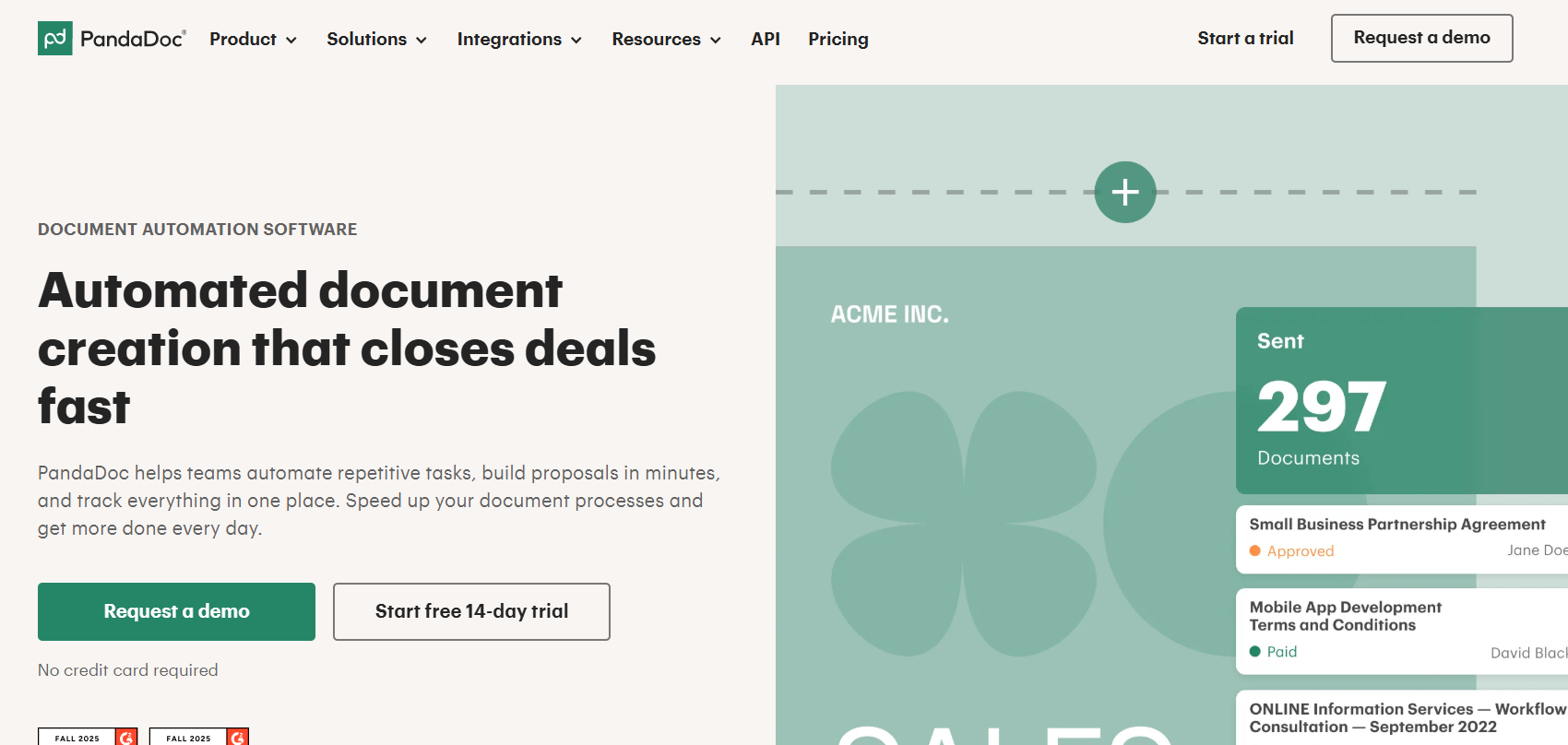
PandaDoc stands out as a robust document automation platform that seamlessly integrates electronic signatures into its comprehensive workflow. Its primary value proposition lies in its ability to streamline the entire document lifecycle, from creation and collaboration to sending, signing, and tracking. This makes it more than just an e-signature tool; it's a solution designed to automate processes and improve efficiency across sales, legal, and HR departments. The platform excels at handling complex document workflows, offering features that go beyond simple signature collection.
Key Features:
Document Automation & Workflows: PandaDoc allows users to create dynamic document templates with custom content, pricing tables, and legally binding e-signatures. It supports automated workflows, enabling teams to set up predefined steps for document review, approval, and sending, significantly reducing manual intervention.
Interactive Content: The platform facilitates the creation of interactive documents, where recipients can engage with pricing tables, choose options, and provide information directly within the document before signing. This enhances the user experience and can speed up the process.
Real-time Tracking & Analytics: Users receive real-time notifications when a document is viewed, commented on, or signed. Detailed analytics provide insights into document engagement, helping teams understand prospect behavior and follow up effectively.
CRM and App Integrations: PandaDoc offers integrations with popular CRM systems like Salesforce, HubSpot, and Pipedrive, as well as other business tools, allowing for a connected ecosystem and automated data transfer.
Pros:
Exceptional Automation Capabilities: PandaDoc truly shines in its document automation features. It’s built for businesses that need to standardize and streamline repetitive document processes, moving beyond just signatures to the entire document creation and management experience.
User-Friendly Interface: Despite its extensive features, PandaDoc maintains a relatively intuitive interface, making it accessible for users who may not be highly technical. Creating templates and setting up basic workflows is straightforward.
Comprehensive Document Management: It handles the entire document journey, from initial creation and internal collaboration to final execution and archiving. This holistic approach simplifies document management for teams.
Cons:
High Cost for Advanced Features: While PandaDoc offers a free plan, its most powerful automation and integration features are locked behind higher-tier paid plans, which can become quite expensive, especially for smaller businesses or teams with limited budgets.
Can Be Overkill for Simple Needs: If your primary requirement is just collecting electronic signatures on simple documents, PandaDoc’s extensive automation features might be more than you need, making simpler, more cost-effective alternatives a better fit.
Pricing:
PandaDoc offers several pricing tiers. The free plan provides basic e-signature capabilities for a limited number of documents. Paid plans, such as the "Essentials" and "Business" tiers, unlock more advanced features like custom branding, unlimited templates, CRM integrations, and advanced analytics. Pricing varies based on the number of users and the specific plan chosen, with business plans often starting around $49-$99 per user per month when billed annually.
Best For:
PandaDoc is ideal for sales teams, legal departments, and HR professionals who deal with a high volume of documents and require robust automation, custom workflows, and comprehensive tracking. Businesses that need to standardize proposal generation, contract management, onboarding paperwork, and other document-intensive processes will find significant value. Its integration capabilities make it particularly suitable for organizations already invested in CRM and other business software.
Bottom Line:
PandaDoc is a top-tier document automation platform that leverages e-signatures as part of a broader workflow solution. It's an excellent choice for businesses looking to automate their document processes, enhance collaboration, and gain deep insights into document engagement. While its advanced features come at a premium, the efficiency gains and improved workflow management can justify the investment for organizations with complex document needs. Consider PandaDoc if you're aiming to move beyond basic e-signatures and optimize your entire document lifecycle.
4. Dropbox Sign
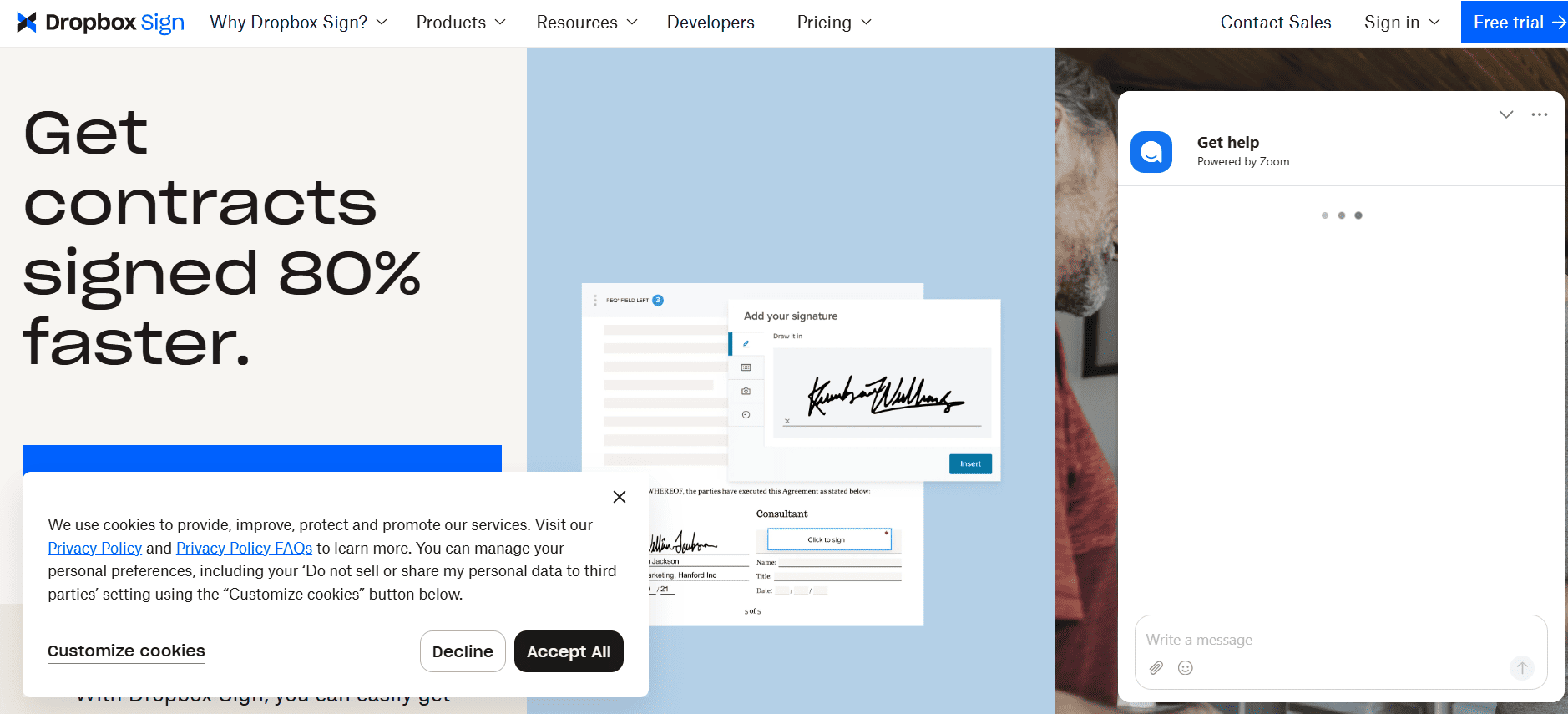
Dropbox Sign, formerly HelloSign, offers a streamlined electronic signature solution designed to simplify document workflows for individuals and businesses. It focuses on providing a user-friendly platform for sending, signing, and managing documents, aiming to reduce the time spent on manual processes. Its integration with the broader Dropbox ecosystem further enhances its appeal for existing Dropbox users, offering a cohesive experience for file storage and document management.
Key Features:
Intuitive Signing Process: Dropbox Sign emphasizes a straightforward experience for both senders and signers. Senders can easily upload documents, add signature fields, and send them out for execution, while recipients can sign with minimal friction.
Audit Trail: Each document signed through Dropbox Sign is accompanied by a comprehensive audit trail. This log details every action taken on the document, including when it was sent, viewed, and signed, providing essential security and compliance verification.
Template Creation: Users can create reusable templates for frequently used documents. This feature saves time by pre-placing signature fields, text boxes, and other necessary elements, ensuring consistency and efficiency for repetitive tasks.
Integrations: Dropbox Sign offers integrations with popular business tools, including CRM systems and productivity suites. This allows for seamless incorporation into existing workflows, enabling document signing without leaving other essential applications.
Team Management: For businesses, it provides features for team collaboration, allowing multiple users to manage requests, track document status, and maintain a centralized record of agreements.
Pros:
Ease of Use: The platform is widely recognized for its simple interface, making it accessible even for users with limited technical expertise. Setting up documents and sending them for signature is typically a quick and intuitive process.
Cost-Effectiveness: Compared to some enterprise-level solutions, Dropbox Sign often presents a more affordable option, particularly for small to medium-sized businesses looking for a reliable e-signature tool without a premium price tag.
Reliable Audit Trails: The robust audit trail provides a high level of assurance regarding the authenticity and integrity of signed documents, which is crucial for legal and compliance purposes.
Cons:
Limited Advanced Features: While excellent for basic signing needs, Dropbox Sign might lack some of the more advanced workflow automation or proposal generation capabilities found in other specialized platforms. It's more of a dedicated e-signature tool than an end-to-end document management system.
Integration Depth: While integrations exist, they might not be as deep or customizable as those offered by some competitors, which could be a limitation for businesses with highly specific or complex workflow requirements.
Pricing:
Dropbox Sign offers tiered pricing plans. The Free plan provides basic functionality with limited document sends per month. Paid plans, such as the Standard and Premium tiers, unlock more advanced features like unlimited sending, custom branding, advanced team management, and enhanced integration capabilities. Specific pricing details typically vary based on the number of users and the chosen feature set, with annual subscriptions offering cost savings. For instance, the Standard plan usually starts around $25 per user per month when billed annually, offering unlimited document sending and more robust features than the free version.
Best For:
Dropbox Sign is an excellent choice for small to medium-sized businesses, freelancers, and individual professionals who require a straightforward, reliable, and affordable solution for electronic signatures. It’s particularly well-suited for those already using Dropbox for file storage, as the integration offers a convenient, unified experience. It excels in scenarios like onboarding new clients, signing vendor agreements, obtaining employee consent, or securing approvals for standard documents where advanced workflow customization isn't a primary concern.
Bottom Line:
Dropbox Sign delivers a no-nonsense, user-friendly electronic signature experience that effectively handles the core requirements of most businesses. Its affordability, ease of use, and robust audit trails make it a strong contender for organizations prioritizing efficiency and simplicity in their document signing processes. If your main goal is to get documents signed quickly and securely without a steep learning curve or hefty investment, Dropbox Sign is a compelling option.
5. SignNow
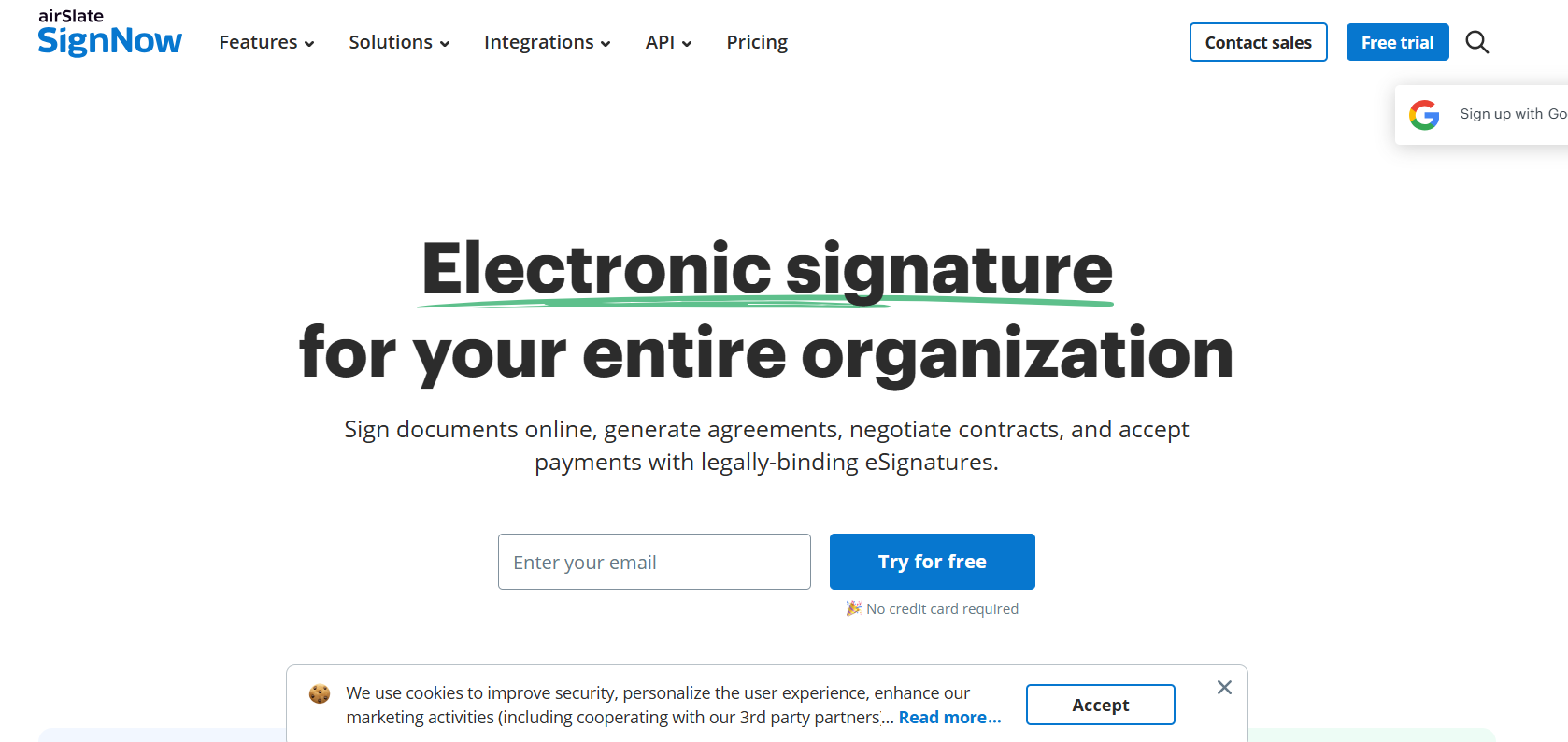
SignNow is a robust electronic signature platform designed to streamline document workflows and secure legally binding agreements. It distinguishes itself by offering a comprehensive suite of tools that go beyond simple signature collection, aiming to manage the entire document lifecycle from creation to archiving. Its focus on flexibility and integration makes it a versatile choice for businesses looking to digitize their contract and approval processes efficiently.
Key Features:
Advanced Document Workflow Automation: SignNow allows users to create custom workflows for document approval and signing. This means you can set up sequential or parallel signing steps, assign specific roles, and automate reminders, ensuring documents move through the process without manual intervention.
Integration Capabilities: The platform offers integrations with popular business applications. This connectivity allows for seamless data transfer and process automation, connecting your e-signature needs with your existing CRM, cloud storage, or other business tools.
Audit Trail and Compliance: Every document processed through SignNow is accompanied by a detailed audit trail. This record includes information about who signed, when, where, and what actions were taken, providing a clear chain of custody essential for legal and compliance purposes.
Mobile Accessibility: SignNow provides a mobile application, enabling users to send, sign, and manage documents on the go. This ensures business continuity and responsiveness, regardless of location or device.
Template Creation: Users can save frequently used documents as templates, pre-filling standard information. This feature significantly speeds up the process of sending out new documents for signature.
Pros:
Comprehensive Workflow Management: SignNow excels at managing complex document processes. Its automation features reduce manual effort and potential errors, making it ideal for businesses with high volumes of contracts or approvals.
Strong Integration Ecosystem: The ability to connect with other business tools is a significant advantage. This compatibility streamlines operations by keeping all relevant data in one place and automating tasks across different platforms.
User-Friendly Interface: Despite its advanced capabilities, SignNow is often praised for its intuitive design, making it relatively easy for new users to adopt and navigate its features.
Cons:
Pricing Structure: While offering a free trial, the advanced features and higher usage tiers can become costly, potentially making it a less accessible option for very small businesses or individuals with limited budgets.
Feature Overload for Simple Needs: For users who only require basic e-signature functionality, SignNow's extensive feature set might feel overwhelming or unnecessary.
Pricing:
SignNow offers several pricing tiers, typically including a free trial period. Plans often start with a basic package that includes core e-signature functionalities and scale up to enterprise solutions with advanced automation, integrations, and dedicated support. Specific pricing details are best confirmed on their official website, as they often adjust based on user needs and market conditions, but expect plans to range from approximately $8 to $50+ per user per month when billed annually.
Best For:
SignNow is particularly well-suited for small to medium-sized businesses (SMBs) and enterprise departments that handle a significant volume of documents requiring signatures and approvals. Its robust workflow automation and integration capabilities make it an excellent choice for sales teams managing contracts, HR departments processing onboarding documents, legal teams securing agreements, or any organization looking to digitize and optimize its document management processes. Businesses prioritizing a streamlined, end-to-end digital document experience will find SignNow a powerful solution.
Bottom Line:
SignNow earns its place on this list by offering a powerful, flexible platform that manages the entire document signing process, not just the signature. Its strengths lie in its advanced workflow automation, extensive integration options, and comprehensive audit trails, making it a reliable choice for businesses aiming for maximum efficiency and compliance. While its pricing might be a consideration for the smallest operations, the value it provides in streamlining complex document management makes it a strong contender for organizations ready to fully digitize their workflows.
6. Proposify for Proposals
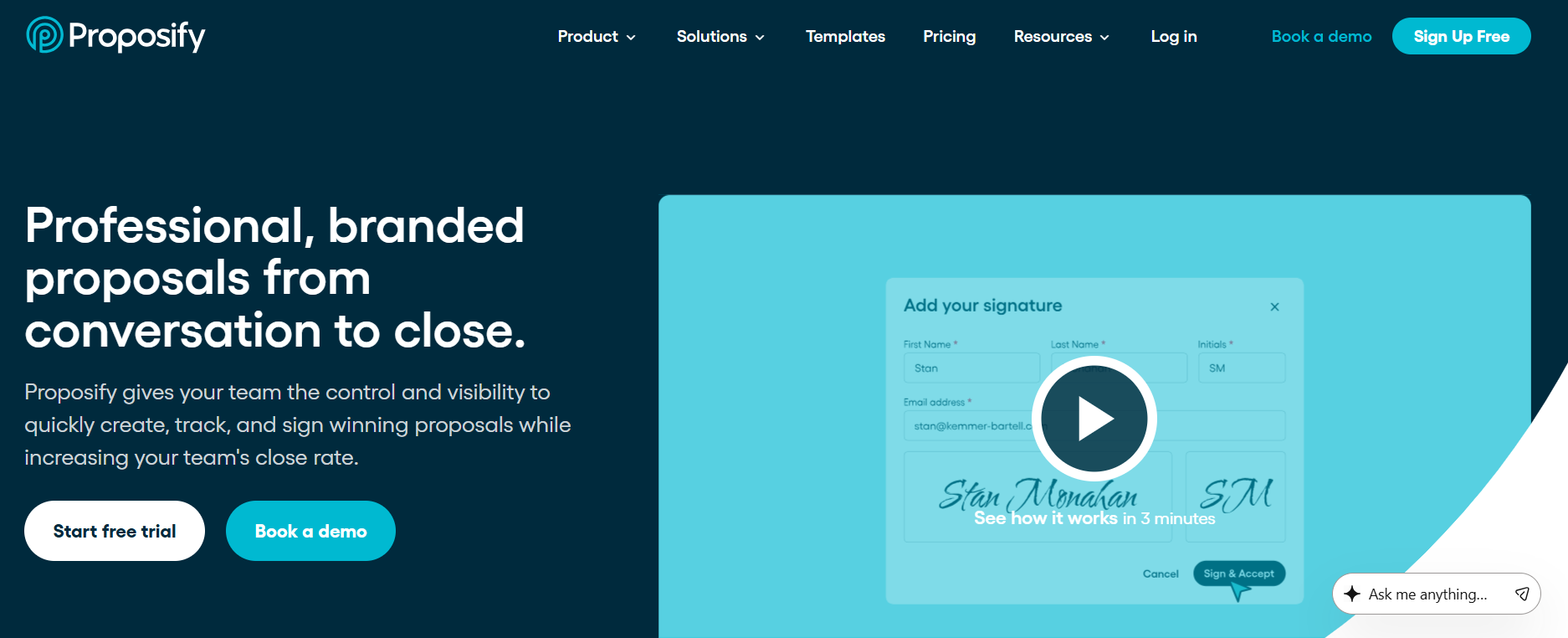
Proposify is a robust platform designed to streamline the creation, sending, and tracking of proposals and other sales documents. It moves beyond simple e-signatures by focusing on the entire proposal lifecycle, integrating interactive elements and analytics to enhance the sales process. This tool is built for teams that need to present professional, engaging proposals and gain insights into client engagement.
Key Features:
Interactive Proposal Builder: Proposify offers a dynamic editor that allows users to build visually appealing and interactive proposals. This includes embedding videos, GIFs, and custom branding, making documents more engaging than static PDFs.
Template Library: A vast library of professionally designed templates can be customized to fit specific brand guidelines and sales needs, saving significant time in document creation.
Analytics and Tracking: Detailed analytics provide insights into client engagement. You can see when a proposal is viewed, how long it's looked at, and which sections are most popular, offering valuable feedback for sales strategies.
Electronic Signatures: While not its sole focus, Proposify includes integrated e-signature capabilities, allowing clients to sign documents directly within the proposal interface, expediting the closing process.
Version Control: Easily manage different versions of proposals and track changes, ensuring everyone is working with the most up-to-date information.
Team Collaboration: Features facilitate collaboration among sales teams, enabling them to work together on proposals, share feedback, and maintain brand consistency.
Pros:
Enhanced Engagement: The interactive nature of Proposify documents significantly boosts client engagement compared to traditional static documents.
Streamlined Workflow: It effectively manages the proposal process from creation to signature, reducing administrative overhead for sales teams.
Valuable Insights: The detailed analytics offer actionable data on prospect behavior, allowing sales reps to tailor their follow-ups more effectively.
Cons:
Learning Curve: With its extensive feature set, there can be a moderate learning curve for users to master all of Proposify's capabilities.
Cost for Advanced Features: While basic functionality is available, unlocking the full suite of advanced features and integrations may come at a higher price point.
Pricing:
Proposify offers several pricing tiers, typically including:
Teams: Geared towards small to medium-sized teams, offering core proposal creation and signature features.
Business: For larger organizations, this plan usually includes advanced analytics, CRM integrations, and enhanced collaboration tools.
Enterprise: Custom pricing for large enterprises with specific needs, often involving dedicated support and advanced security features.
Specific pricing details are generally available upon request or through their website, as they often tailor solutions to business needs.
Best For:
Proposify is ideal for sales teams, marketing departments, and agencies that regularly create and send proposals, quotes, and contracts. Businesses looking to elevate their proposal presentation beyond standard PDFs and gain deeper insights into prospect interactions will find Proposify particularly beneficial. It’s a strong choice for companies that view proposals not just as documents, but as a critical part of the sales and marketing engagement strategy.
Bottom Line:
Proposify stands out by focusing on the entire proposal lifecycle, making it more than just an e-signature tool. Its strength lies in creating engaging, interactive documents and providing analytics that empower sales teams to close deals more effectively. If your business relies heavily on proposals and you want to improve client engagement and track document performance, Proposify is a compelling option to consider.
7. Qwilr Interactive Proposals
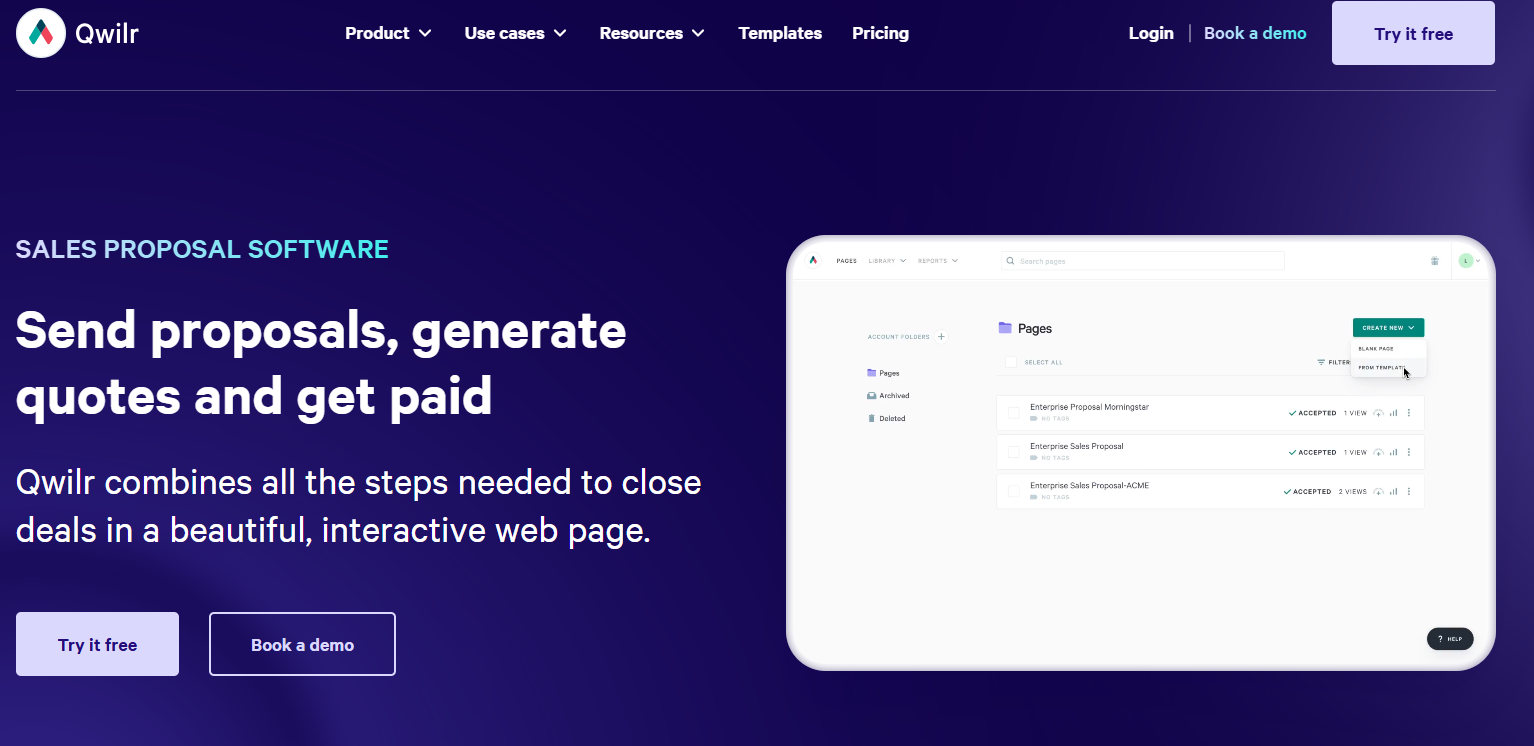
Qwilr distinguishes itself by focusing on creating visually engaging and interactive sales documents, rather than just being a standard e-signature tool. Its core value proposition lies in transforming static proposals, quotes, and contracts into dynamic web pages that clients can engage with, review, and approve directly online. This approach aims to boost conversion rates by making the closing process more appealing and transparent.
Key Features:
Interactive Document Creation: Qwilr allows users to build proposals that look and feel like custom websites. These aren't just PDFs; they include rich media like videos, animated graphics, and embedded pricing tables that clients can customize themselves.
Real-time Analytics: You gain insights into client engagement with your documents. Qwilr tracks when a document is viewed, for how long, and which sections are most popular, providing valuable intel for sales follow-ups.
E-signature Integration: Once a client is ready, they can electronically sign the document directly within the interactive Qwilr page, streamlining the final approval step.
Template Library: A range of professionally designed templates are available to help you quickly create branded and effective sales documents.
CRM Connectivity: While not explicitly detailed in the provided snippet, integration capabilities are a common feature for such platforms, likely allowing for seamless data flow with popular CRM systems.
Pros:
Enhanced Client Experience: The interactive nature of Qwilr documents makes them far more engaging and persuasive than traditional static proposals, leading to a better impression on potential clients.
Improved Closing Rates: By providing a clear, interactive, and easy-to-approve closing mechanism, Qwilr is designed to accelerate the sales cycle and increase the likelihood of a deal being closed.
Valuable Engagement Insights: The analytics provided offer a clear picture of client interest, enabling sales teams to tailor their follow-up strategies effectively.
Cons:
Focus on Proposals: While it includes e-signatures, Qwilr's primary strength and design are centered around the proposal creation and delivery process. It may be overkill if you strictly need a standalone, document-agnostic e-signature solution.
Potential Learning Curve: Building highly interactive web-based documents might require a slight adjustment period for users accustomed to simpler document editors.
Pricing:
Specific pricing tiers were not detailed in the provided research context. However, platforms like Qwilr typically offer tiered plans based on features, user seats, and document volume. It's common to find options ranging from a basic plan suitable for small teams to enterprise-level solutions with advanced customization and support. Expect pricing to be competitive within the sales enablement and proposal software market.
Best For:
Qwilr is an excellent choice for sales teams, agencies, and businesses that rely heavily on proposals, quotes, and presentations to win new business. It's particularly beneficial for companies looking to elevate their sales collateral beyond standard PDFs and create a more modern, professional, and interactive client engagement process. Businesses that value a seamless transition from proposal to signed contract within a single, aesthetically pleasing platform will find Qwilr a strong contender.
Bottom Line:
Qwilr secures its spot on this list by offering a unique blend of interactive proposal design and integrated electronic signatures. It moves beyond basic document signing to provide a comprehensive solution for crafting compelling sales documents that drive engagement and close deals faster. If your primary goal is to impress clients with dynamic proposals and streamline the signing process, Qwilr is definitely worth considering.
8. GetAccept: Sales Digital Signatures
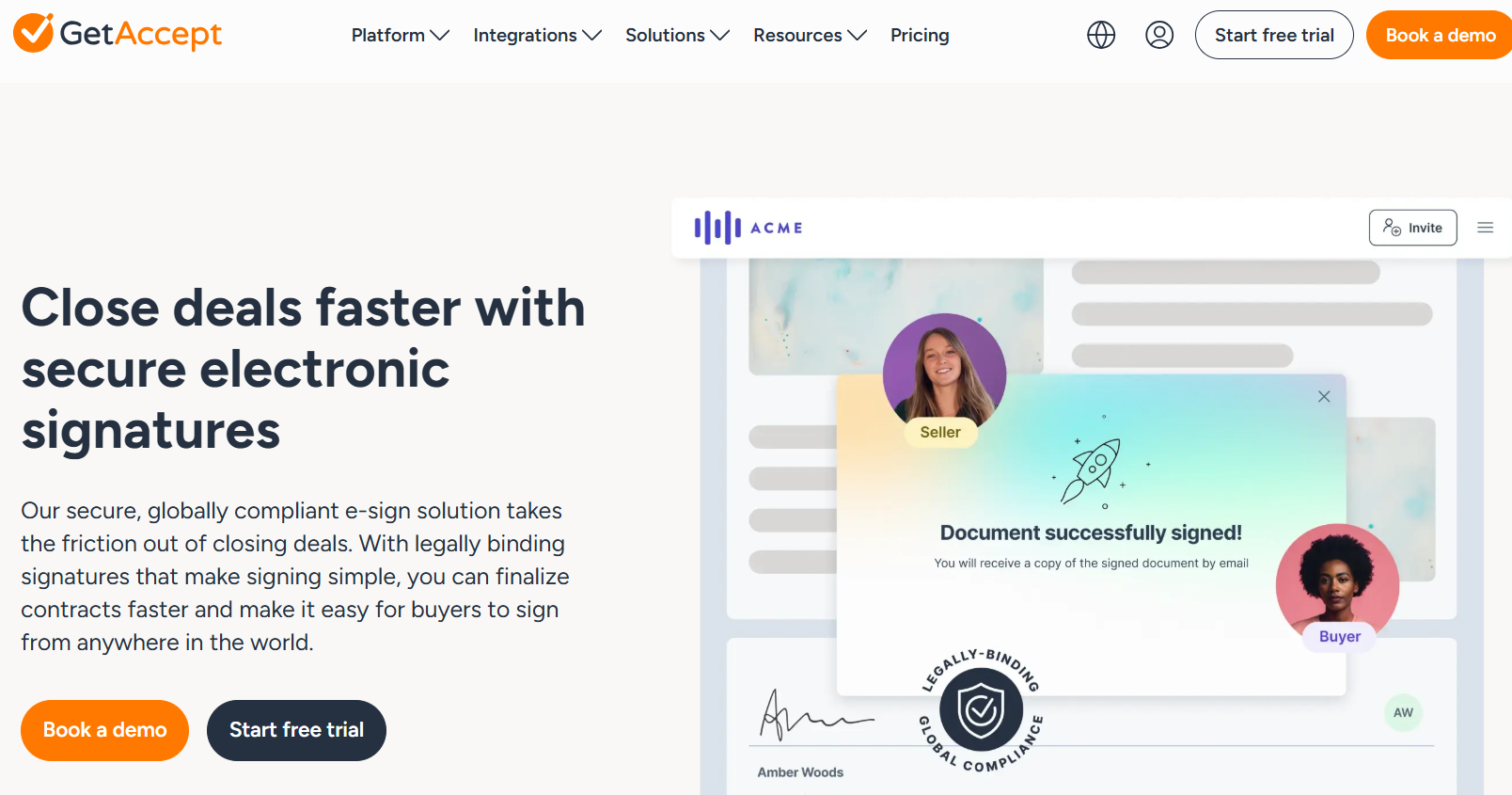
GetAccept is a sales-focused platform that combines digital signatures with robust proposal management capabilities. It's designed to streamline the entire sales closing process, moving beyond simple e-signature to offer tools that enhance engagement, automate workflows, and provide deep insights into document interactions. This makes it a powerful ally for sales teams looking to close deals faster and more efficiently.
Key Features:
Real-time Tracking: GetAccept provides live notifications and analytics, showing you precisely when recipients open, view, spend time on, and complete your documents. This granular insight allows sales reps to time follow-ups perfectly and understand prospect engagement levels.
Automatic Reminders: The system can automatically send follow-up reminders to signatories who haven't completed their tasks, reducing the need for manual chasing and ensuring documents don't get lost in crowded inboxes.
CRM Integration: It seamlessly connects with popular CRM systems, allowing for a smoother workflow where proposals and contracts can be generated, sent, and tracked directly from your existing sales tools.
Proposal Automation: Beyond just signatures, GetAccept helps in creating dynamic and interactive sales proposals, which can include rich media, pricing tables, and other engaging content to capture buyer attention.
Pros:
Sales Workflow Optimization: Its primary strength lies in its ability to manage the entire sales document lifecycle, from proposal creation to final signature, with integrated tracking and automation.
Enhanced Engagement Insights: The detailed real-time tracking offers unparalleled visibility into prospect behavior, enabling more strategic sales outreach.
Efficiency Gains: By automating reminders and integrating with CRMs, GetAccept significantly cuts down on administrative tasks and manual follow-ups, freeing up sales reps' time.
Cons:
Feature Richness: While a pro for many, the extensive feature set might present a steeper learning curve for users who only need basic e-signature functionality and are not focused on advanced sales workflow automation.
Potential Overkill for Simple Needs: Businesses with very straightforward, low-volume signing requirements might find GetAccept's advanced sales-centric features more than they need.
Pricing:
GetAccept offers tiered pricing plans designed to scale with business needs. While specific figures can vary and are best confirmed on their official site, plans typically include options for individual users, small teams, and larger enterprises, with features progressively unlocking at higher tiers. Expect packages to cover core e-signature functionalities, advanced analytics, CRM integrations, and automation tools.
Best For:
This platform is ideal for sales teams, particularly in B2B environments, who are heavily reliant on proposals, quotes, and contracts to close deals. Companies using CRMs and looking to gain deeper insights into their sales process, automate repetitive tasks, and improve prospect engagement will find GetAccept particularly beneficial. It's well-suited for businesses that view document management not just as a compliance step, but as an integral part of their sales strategy.
Bottom Line:
GetAccept stands out as a specialized tool for sales professionals who need more than just an electronic signature. Its strength lies in its comprehensive approach to managing the sales document workflow, offering powerful tracking and automation features that directly contribute to closing more deals. If your priority is optimizing sales engagement and efficiency through digital documents, GetAccept is a leading contender.
Conclusion
Navigating the world of electronic signature apps in 2025 reveals a landscape of powerful tools designed to streamline your workflows. From simplifying contract management to accelerating deal closures and securing essential approvals, these platforms are no longer a luxury but a necessity for efficient business operations. Each of the solutions highlighted offers distinct advantages, catering to varying needs whether you require a straightforward signing tool or a comprehensive system for document management.
The key takeaway is clear: embracing e-signature technology significantly cuts down on manual processes and eliminates frustrating delays. Don't let outdated paper-based methods hold your business back any longer. Take the next step and evaluate the options presented in this guide against your specific requirements. Choose the platform that best fits your team's size, budget, and workflow complexity to start reaping the benefits of faster, more secure document signing today.


